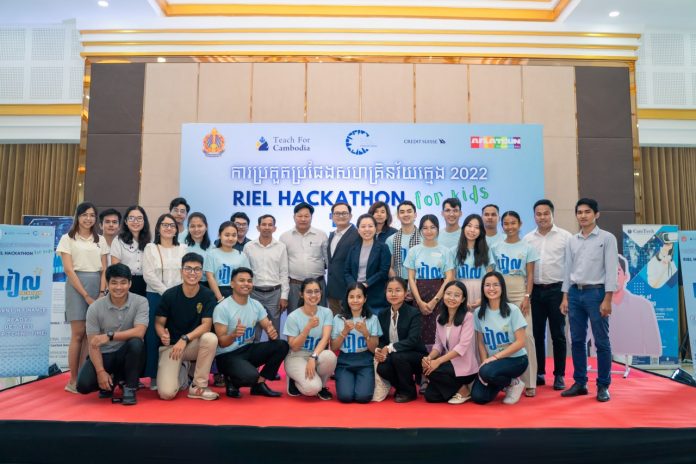![]() Written by: Tom Starkey from the Cambodia Investment Review
Written by: Tom Starkey from the Cambodia Investment Review
The first phase of the Teach For Cambodia (TFC) Financial Education Program, which took over 1,200 students from five public schools on board for its three-month pilot, finished with the ‘Riel Hackathon’. The first-of-its-kind event showcased 18 group finalists – aged 12-17 – who pitched business ideas based on a 20,000 riel seed investment.
Delivered in partnership with Global Shapers and funded by Credit Suisse, the competition was designed to mentor the next generation on the importance of financial literacy while developing key educational skills through a gender lens, in recognition of the different challenges boys and girls experience.
Opening the ceremony, hosted by CamTech University, TFC Senior Programme Manager Ms. Sreyleap Taing said for students to make it to the finals, they must have demonstrated good business knowledge, courage, and resilience.
“Succeeding in this course has been about showing multiple skills. Not only identifying a problem but generating solutions to that problem through teamwork and innovation,” Sreyleap Taing said.
“We want young people to develop their knowledge and share it back in their schools and hometowns. Everything they have learned for the past 3 months does not stop here,” she added.

The curator from Global Shapers Phnom Penh Hub, Ms. Ponhneath Nguon, said Cambodia is developing fast and investing in young people’s financial literacy is key for the future.
“Financial education is integral for developing the leaders of tomorrow. All students here have shown great technical capability and self-determination to get involved in the weekly online coaching sessions as part of the program and we have witnessed an inspiring change in thinking from the participants. Global Shapers Phnom Penh Hub is incredibly proud to have worked closely with Teach For Cambodia on this program,” she added.
All of the presentations by the students demonstrated excellent business acumen, with innovative plans that implemented key concepts including supply and demand strategy, financial forecasting, target audience identification, customer relationship management, product trial and development as well as plans for future expansion.
Innovative plans that implemented key concepts
Most teams incorporated sustainable business practices, from promises to use less plastic packaging to fully eco-orientated proposals, including online clothing upcycling and plastic repurposing businesses.
One group, named Khmer Cake, also wanted to highlight the importance of using Cambodian products over imported ones, arguing that they were less processed, could be wrapped in eco-friendly banana leaf packaging, and would support local businesses.
The two winning teams, one junior and one senior were team “Klem Klang” from Hun Sen Sompov Poun High School and team “Island Soy Milk” from Bun Rany Hun Sen Koah Dach High School. The latter sold a soymilk drink based on three core selling points, namely cleanliness, quality, and affordability, which saw them more than triple their 20,000 riel investment.

Member of team Island Soy Milk – who won 300,000 riels – Seng Hok said, “I am proud of myself and my team. We showed we have the ability to make a good business.”
“We used our team’s experience with our product to our advantage and we knew who the drink would be popular with. As a result, we made 100,000 riels in just three days and we could have expanded more!” he said.
Second place was awarded to ‘Delivery Kids’ from Hun Sen Sompov Poun, who offered a low-cost cross-campus delivery service, bagging them 200,000 riels.
Finally, third place went to Baramey Nek Rean from Cheasim Chroy Changvar High School, who sold fashionable bracelets that they made themselves, earning 125,000 riels.
Wrapping up the event, Ms. Taing said that the program isn’t just about the financial aspects, it’s about helping students understand their ambitions and how they can realize their potential.
“Each of the groups has identified different problems in their communities, and they have generated solutions to those issues through their business proposals. Through teamwork and problem-solving, they have delivered real, tangible ways through the issues that their communities face. We want to foster more of that in Cambodia,” she said.
The Riel Hackathon marks the end of phase one of the financial education initiative, with phase two starting when schools resume in January 2023.
For more business news in Cambodia, go to Cambodia Investment Review (https://cambodiainvestmentreview.com/)
